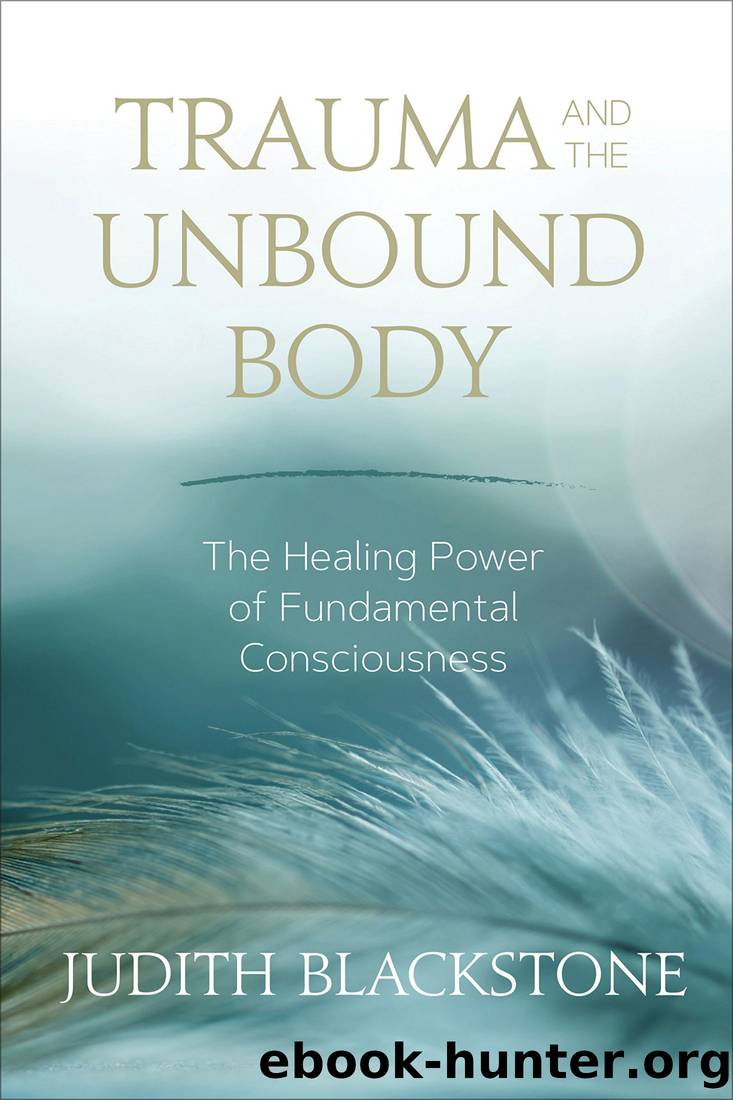Trauma and the Unbound Body: The Healing Power of Fundamental Consciousness by Judith Blackstone

Author:Judith Blackstone
Language: eng
Format: mobi, epub
ISBN: 9781683641834
Publisher: Sounds True
Published: 2018-12-01T00:00:00+00:00
Part I: The Therapeutic Relationship
When, as therapists, we can experience fundamental consciousness
pervading ourselves and our clients, the therapeutic relationship
is transformed in several ways. Our own presence is more centered,
grounded, and empathic; we can track our internal responses to our
clients more clearly; our perception of our clients is more refined; and we are more open to the spontaneous emergence of the healing process.
The Therapistâs Presence
It is widely accepted, in the current field of psychotherapy, that one of the most healing components of the psychotherapeutic process is the
relationship between the client and the therapist. One of the biggest shifts that has occurred over the history of psychotherapy is in the client-therapist relationship, especially regarding how personally connected we should be when we sit with a client.
Freud recommended that the analystâs awareness be a âhovering
attentionâ that does not interfere with or interact in any way with
173
APPENDIX
the patientâs narrative. He faced away from his patients so they could enter without distraction into a monologue of free association. In this way, Freud felt that the patientâs buried, pathogenic memories would eventually, spontaneously surface to consciousness. Freud would then interpret the meaning of the patientâs memories and dream images and their role in the origin of the patientâs neurosis.
The Freudian ideal of detachment often produced psychoanalysts
who were distracting simply by their lack of engagement. Their emo-
tional reticence and their interpretations of their patientsâ lives often took on an authoritarian stance in which they seemed to be above and beyond any sort of emotional difficulty themselves, observing from on high their patientsâ anguish.
This detached, authoritarian attitude has been rejected in most
contemporary forms of psychotherapy, as well as in relational inno-
vations within psychoanalysis. Relational analysts coined the term
âtwo-personâ therapy to designate the recognition of the basic equality between the analyst and patient. Many therapists consider their own
emotional responsiveness to be a crucial element in the psychothera-
peutic process. These more contemporary forms of psychotherapy
and psychoanalysis acknowledge that we can never completely sup-
press our personality or our true responses to the client, so analytic detachment is not even possible. Some relational modalities, such as Intersubjectivity Theory, developed by Robert Stolorow and George
Atwood, go so far as to claim that even the clientâs narrative is âco-createdâ by the therapist and client. Even the clientâs memories are shaped in part by the therapistâs collaboration and by the therapistâs personal and cultural biases.
Yet, the relationship between the therapist and the client can also
present the biggest challenges or even obstacles to the clientâs healing.
If the therapistâs emotional responses to the client are angry, shaming, envious, or sexual or if the therapistâs relational style is withdrawn or intrusive, then the relationship may even be destructive for the client.
Also, if the therapistâs contact with themselves, and subsequently with others, lacks depth or cohesion, or if they live much more in one part of themselves than another, the relationship may be confusing and
174
APPENDIX
unsatisfying for the client. The client may not feel heard or received because of the limitations in the therapistâs capacity for contact with another person.
The
Download
Trauma and the Unbound Body: The Healing Power of Fundamental Consciousness by Judith Blackstone.epub
This site does not store any files on its server. We only index and link to content provided by other sites. Please contact the content providers to delete copyright contents if any and email us, we'll remove relevant links or contents immediately.
Should I Stay or Should I Go? by Ramani Durvasula(7658)
Why We Sleep: Unlocking the Power of Sleep and Dreams by Matthew Walker(6706)
Fear by Osho(4727)
Flow by Mihaly Csikszentmihalyi(4689)
Rising Strong by Brene Brown(4451)
Why We Sleep by Matthew Walker(4434)
The Hacking of the American Mind by Robert H. Lustig(4375)
How to Change Your Mind by Michael Pollan(4355)
Too Much and Not the Mood by Durga Chew-Bose(4338)
Lost Connections by Johann Hari(4174)
He's Just Not That Into You by Greg Behrendt & Liz Tuccillo(3891)
Evolve Your Brain by Joe Dispenza(3671)
The Courage to Be Disliked by Ichiro Kishimi & Fumitake Koga(3489)
Crazy Is My Superpower by A.J. Mendez Brooks(3398)
In Cold Blood by Truman Capote(3375)
Resisting Happiness by Matthew Kelly(3337)
What If This Were Enough? by Heather Havrilesky(3308)
The Book of Human Emotions by Tiffany Watt Smith(3303)
Descartes' Error by Antonio Damasio(3271)
